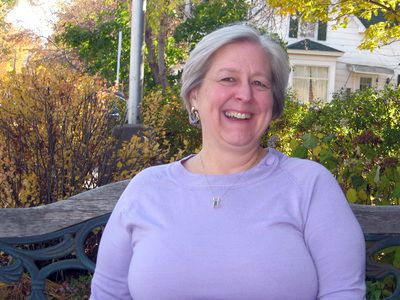Since the start of the recession in December 2007, the number of unemployed
persons has increased by 7.6 million to 15.1 million. In Minnesota last month, 4,000 people gave up their quest for work. The unemployment rate isn’t a number. It’s individuals with life stories to tell. Here’s one.
In the three years since Chris Johnson of White Bear Lake has held a “permanent” full-time job, she’s encountered the reality of today’s hiring process. “Human Resources is neither humane, nor resourceful,” she told me today. “I can have some empathy. Those people are deluged with stuff. It’s a numbers game.”
But for today’s job hunters, they rarely get to meet the people. “It’s a black hole,” she says. Companies tell prospective employees they have to apply for jobs online. “You go through this vortex that just asks questions. It asks if I have a college degree but there’s nowhere to indicate I’m only 8 credits short.” Maybe you’ll hear back from a company, but probably not.
When a person doesn’t get a job via this system, “there’s no way to follow up or do a post mortem,” she says. It makes it difficult to find out what to change when the next prospective job comes along.
Johnson lost her job as a volunteer and event manager (she jokes that she was a “pledge goddess”) for Twin Cities Public Television in 2006. She helped coordinate membership drives. She’s looking for work in marketing, community relations and has been focusing recently on event management and voice-over work.
“I thought I’d have a job by the end of the year (2006),” she says. “I keep hearing, ‘You’ve got a great resume.’ I’ve followed the rules — networking, researching, calling, answering ads — but nothing seems to click. I can’t crack the system”
She’s had part-time and temporary work since then; “enough to keep the wolf away from the door.” But she’s hardly an example of the destitution that often comes from long-term unemployment. “I live quite frugally and had saved/invested some money over the years.” But she’s got two mortgages on her White Bear Lake home, and one on a house in Little Marais that she rehabbed with her aging father (an experience she wouldn’t trade for a job). She’s been dipping into her retirement savings to get by, she gets a couple hundred dollars a week in unemployment, and her health care plan is a simple one. “I pray,” she says.
She describes a litany of failed job interviews, including “the 20-something in pointed high heels” who icily looked her over when she showed up for an interview after a warm exchange over the phone. She’s 52 and, apparently, sounds younger over the phone.
She says she overwhelmed a young man in a recent interview. “I don’t think he expected to be interviewing his mother,” she said, acknowledging “there is a bias” against the older work applicant.
“I like to think the universe is going to give me what I need,” she says, then amends that statement to point out that so far, it has. “After three years, I suppose I should be living in a cardboard box, but the sun came out today, there’s food on the table, and I’m finding a way to put gas in the car.”
Unemployment, she points out, has allowed her to spend more time with her aging parents — now both in their 90s.
She’s noticed an increase in job postings in the places she looks, but the technology required for job searching these days doesn’t lend itself to high productivity. “I’m on LinkedIn, but I still don’t really know what LinkedIn is,” she says, “and I’m impatient.” She says Twitter, for example, requires one to waste a lot of time in order to — maybe — make a connection that can lead to employment. “If I put in this effort, I want to see the result. I’m not seeing the result,” she says.
Her advice for people who will soon be in her position? “Don’t panic,” she says. “Cry, scream, get it out of your system. Feel it. Live it. Put one foot in front of the other and if something doesn’t work, try something else.”
“It’s a crapshoot,” she says.
(See more in this series. If you’d like to share your story, contact me.)
Check out the map below to read what people in MPR’s Public Insight Network are telling us about the job climate around them. You can find other stories in this series here.

